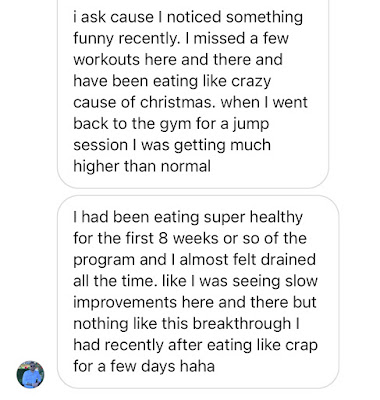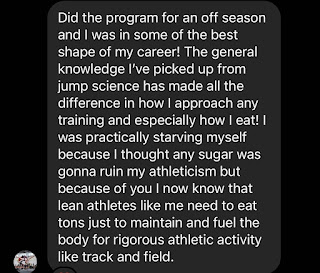Nutrition is a crucial component of sports training that is too often not given much thought. The key thing to understand is that all the intelligent, advanced training in the world is completely useless if the body does not respond to it. Training puts a stimulus on the body, but there is no guarantee that any exercise program will make you better at anything. Gains are made through the body's response to stimuli. This response is heavily dependent on food intake, so nutrition can easily make or break your athletic development. This article covers some basics.
ATHLETES GOTTA EAT
First and foremost, it needs to be emphasized that athletes NEED TO EAT. The body needs energy to stay healthy, recover from workouts, and strengthen itself. People tend to think that those bodily processes are guaranteed to happen. It's important to realize that the body controls its own energy expenditure, and there are numerous factors that affect it. Food intake plays a huge role. When the body has the appropriate fuel, it maintains a high metabolic rate. This is associated with what is called an anabolic hormonal environment, meaning that the body is building itself up. If the body is not well fed, it limits non-vital processes to lower metabolic rate and conserve energy. Basically it moves toward survival mode. This is associated with a catabolic hormonal environment, meaning the body is breaking down its own tissue to get energy. The non-vital processes that suffer are things like muscle growth and nervous system adaptation, processes that are crucial for successful sports training. It is important to avoid that scenario. With that in mind, athletes should aim to eat a lot and have a high metabolic rate, whether the goal is to lose, gain, or maintain weight. For example, let's say an athlete can maintain weight eating 2000 calories and burning 2000 calories each day. That same athlete may also be able to maintain weight while eating 2500 calories, and this would facilitate a higher energy level, better performance, improved endurance, and greater response to training. Eat a lot, burn a lot. Feed the machine. That is the correct approach. Not eating enough is a common nutritional mistake, and a terrible one at that.
I’m actually not a big believer in counting calories. I typically trust my body and just eat intuitively based on my hunger. But as a ball park recommendation, a person who exercises a fair amount and is already lean (8% body fat for males, 15% for females) can aim for a daily caloric intake around body weight (BW) in pounds multiplied by 15-18. (If you are not currently lean, use the weight that you would be if you were lean.) For a teenager who is playing and training for a sport almost every day and going to school full time, caloric needs may far exceed that mark.
MACRONUTRIENTS
Now let's talk macronutrients (carbohydrates, protein, fat). The best fuel for muscular work is a substance called glycogen, which is formed from carbohydrates. If glycogen stores are depleted, the body utilizes fat and protein for energy. The first problem with this is these fuel sources are not converted to useable energy as quickly, and relying on them negatively impacts sports performance. Secondly, depending on the amount of protein in a person’s diet, using protein to fuel activity may come at the expense of muscle repair/building. ATHLETES NEED CARBS. While low carb diets are a fine way to reduce caloric intake and perfectly fine for having a healthy body, they are not conducive to maximizing performance. If daily caloric intake is body weight in pounds x18, a reasonable recommendation for daily grams of carbohydrates would be BW x 2.5-3.
The next dietary requirement is enough protein to repair various structures of the body and maintain healthy function. Someone with a reasonable exercise program who wants to build muscle can shoot for daily grams of protein equal to BW in pounds. An athlete who needs to avoid adding more muscle weight may want to target a more conservative number like 80% of BW.
Next is fat. Your body needs it for lots of reasons. The membrane of each one of the trillions of cells in your body is made of phospholipids (lipids are fat). Fat is used to manufacture cholesterol, which is needed for producing testosterone and other hormones. Fat is needed for transporting vitamins A, D, E, and K. So on and so forth. Your body needs fat. To finish our macronutrient recommendations, daily grams of fat could be equalt to half of BW in pounds. Aim to get it from healthy sources like nuts, seeds, avocados, and animal products. Avoid fried food and other highly processed fat sources.
One more recommendation. This is an obvious one. Eat your vegetables and fruits. Vitamins and minerals are important. Here is a quick list of their functions within the body as well as food sources for each. Vitamin and Mineral Functions.
To sum it up...- Eat enough calories (body weight in pounds x15-18).
- Eat enough carbohydrates (daily grams = BW x 2.5-3).
- Eat enough protein (daily grams = BW).
- Eat healthy fat sources and aim for daily grams equal to half of BW.
- Eat as many vegetables and fruits as possible.
The calorie and macronutrient recommendations are general estimates for a lean and active person. Your needs could be very different. If you want specific recommendations for yourself, talk to a sports dietician.
TIMING
Now let's talk briefly about nutrition timing. Compared to total intake, timing is of less importance. But in order to get appropriate total intake, you will likely need to be intentional about eating balanced meals throughout the day. Common bad habits like skipping breakfast, barely eating during the school/work day, and consuming minimal protein until dinner make it difficult to reach good numbers at the end of the day. The simple solution is eating carbs, protein, and fat in each meal and not skipping meals.
Using a limited feeding window (intermittent fasting) is a popular method for weight loss, but it is not advisable for athletes with a high activity level and thus high macronutrient requirements. If your exercise is limited to short, non-exhaustive training sessions, you might be able to pull off intermittent fasting successfully. But if you’re playing a sport several hours per week, working out twice in a day, exercising for a couple hours at a time, etc, a limited feeding window is probably not right for you.
We need to specifically cover the time surrounding activity. The goal is to not miss a meal and eat 2-3 hours before exercise. When this does not happen, the primary concern is depleted muscle glycogen leading to poor performance and catabolism. We can compensate by eating more carbs in the previous meal and/or using a light carb source immediately before or during the workout. For example if you have to work out early in the morning, eating more carbs the night before is helpful, as is grabbing fruit or a granola bar right when you wake up. As for getting through workouts, hopefully they are not too long or exhaustive. But if they are, again a light carb source helps sustain performance. Apart from the options already mentioned, a sports drink like Gatorade (not the low sugar kind) works well, or I have even used a candy bar successfully. No, that's not a joke. Sugar is effective.
I want to highlight something here. A lot of people play exhaustive sports (basketball, soccer, football, etc) and struggle to sustain performance for an entire game. A lack of conditioning workouts is almost never the problem. Increase your total carb intake, get some sugar during games, and watch your “endurance” improve dramatically.
Much has been made of post-workout nutrition. Again the big picture matters much more than any one meal. That being said, replenishing energy stores and providing nutrients to start the recovery process should happen as soon as possible after exercise. Protein is commonly viewed as priority, but restoring muscle glycogen to avoid catabolism is actually the more immediate need. If you check the nutrition label, many post-workout supplements contain a ratio of 3+ grams of carbs per gram of protein. Ideally after a workout you eat a large healthy meal containing carbs, protein, and lots of vitamins and minerals. If not a large meal, at least eat something. This is where a supplement can be a convenient option, but really any food with carbs and protein works.
To sum up nutrition timing...- Eat balanced meals throughout the day, including 2-3 hours before exercise and as soon as possible after.
- Use small doses of carbs as a short term solution when energy supply is inadequate.






